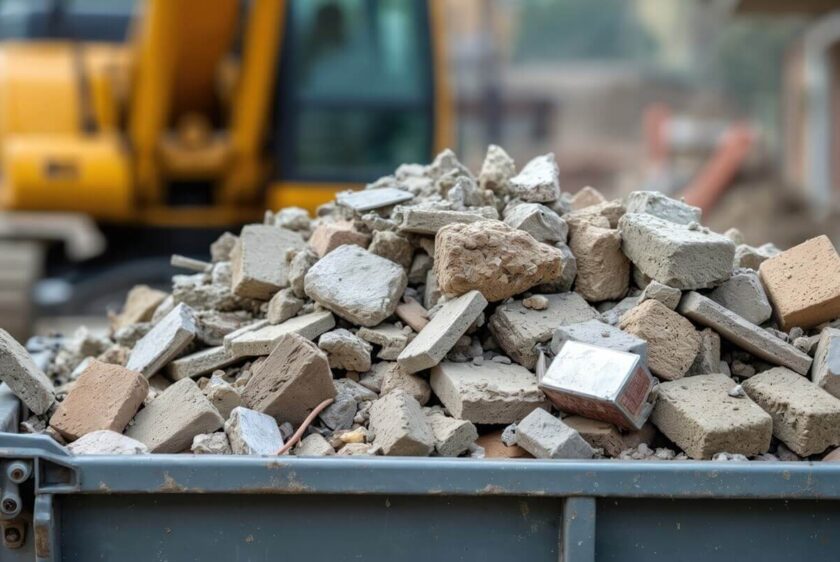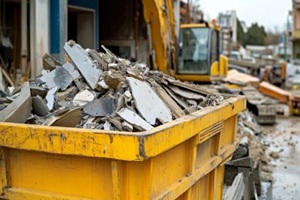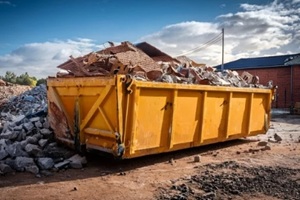
The Importance of Timely Construction Debris Removal at Job Sites
Construction project debris can cause issues even for the most experienced contractors. Broken concrete, material packaging, metal pieces, scrap wood, leftover supplies, and more can make the worksite dangerous, trigger city safety or environmental regulations, and even cause project delays. Poorly managed construction debris removal can cause additional delays, leaving property owners not only to clear the debris but also to face city regulations, fines, and potential liabilities.
Construction debris removal must be timely, safe, and compliant to make sure the project runs smoothly from beginning to end. Local debris removal teams can help property owners follow their city’s logistical and environmental rules, promote sustainability, and keep their job sites safe.
This article details the most important factors of timely construction debris removal and how owners can manage their sites more effectively.
The Significance of Job Site Safety

According to OSHA, over 1,000 people died in one year due to slip and fall accidents on construction sites. Site safety issues can be compounded even further due to the presence of heavy equipment, elevated job areas, and tight deadlines. Failing to remove construction debris in a timely manner can leave a job site vulnerable to injury-related liabilities and workers’ compensation cases.
Leaving loose debris, splintered wood, sharp objects, concrete, and more can not only trip workers but also increase their risk of other non-fatal but serious injuries. Regular debris removal cuts down on risk and helps maintain OSHA standards for job sites in any state. Just as equipment should be kept updated to guarantee safe functionality, job sites should be kept clean to minimize worker risk.
Regulatory Compliance Remains an Issue
Job sites must follow federal, state, and local regulations to keep their workers safe, protect the local environment, and abide by city cleanup rules. Properly disposing of, recycling, and storing construction waste is a significant factor in maintaining compliance. Job sites that fail to follow all relevant rules concerning debris disposal can incur fines, project cancellation or delays, or even legal reprimands.
Today, site owners must reduce the environmental footprint of their projects to maintain compliance, but this can be multi-faceted depending on the project. Job sites handling hazardous substance disposal, such as chemicals or building materials containing asbestos, can contaminate the site and local water sources by delaying timely debris pickup. Though green building and demolition standards differ by state, every site manager is responsible for knowing their local laws and making sure the environment is not being harmed by their project.
In addition to being safer, worksites that remove debris in accordance with local laws also promote sustainability, which helps site owners maintain their certifications as well as their reputations.
Worksite Efficiency Should Be a Priority
When worksites maintain efficiency, workers can access their work areas, use equipment, and access supplies with fewer delays, all of which impact job costs. Sites with higher productivity can manage resources, track budgets, and meet their timelines more effectively, in addition to providing a safe work environment.
Timely debris removal helps everyone on-site by clearing access to necessary areas, removing clutter, and preventing accidents. Every delay on a busy job site can cause costly damage, lost materials, damaged equipment, expensive site downtime, and hidden job costs. For example, an overflowing dumpster may become a safety hazard while simultaneously requiring a waste management service to haul it away at a premium due to overloading the dumpster’s weight limit. Cluttered work areas may cause workers to take inefficient routes to their job areas, eventually resulting in project delays.
With less clutter, materials can be more efficiently delivered and properly staged while equipment and workers can move more freely. The efficiency gained by jobsite cleanup may not be immediate, but the improvements over the course of the entire job will lead to significant cost and time savings.
Maintaining a Professional Image Leads to Significant Benefits
Job site managers must be informed about the rules of compliance that apply to their sites, not only to avoid fines but also to maintain public trust. Construction debris disposal that harms local environments by dumping prohibited materials in landfills demonstrates disrespect for community rules and local safety. High-integrity projects often hire local construction debris removal companies to maintain good local relations, guarantee compliance with local laws, and run sustainable and successful job sites in their states.
Local Debris Removal Teams Help Job Sites Stay Efficient, Compliant, and Profitable

Timely construction debris removal helps job site operators keep their workers safe while following local and federal regulations. It also helps maintain a good reputation with the community while protecting the local environment. These are all essential for maintaining a profitable and reputable construction company in the long term, which is why working with local construction debris removal experts can be such a big help.
At Full Strut Disposal, our team is familiar with all local disposal regulations. We bring a working relationship with local general contractors and disposal sites to help job site operators maintain the safety and efficiency of their projects while preventing unnecessary fines and delays. Contact our team today to learn more about our white glove construction debris services in your area.



